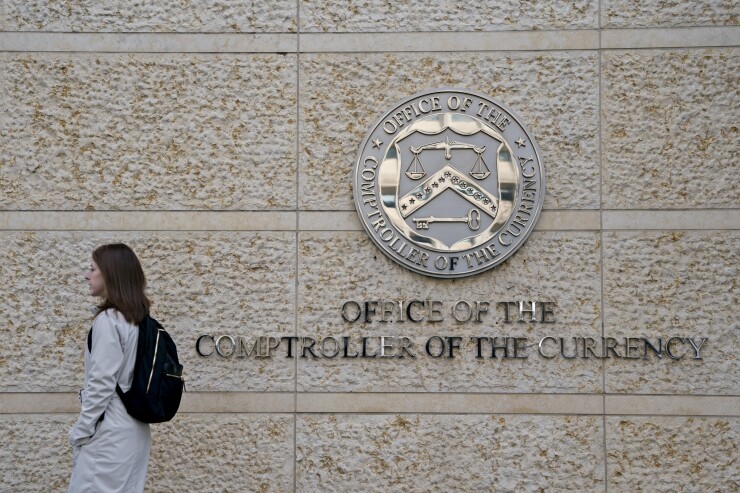Few banks in the country are as upside-down today as Industry Bancshares. But that isn't stopping the Texas company from fighting one of its regulators, which is pushing for fixes after the bank became heavily exposed to rising interest rates.
The spat spilled into public view on Wednesday, when the OCC released documents arguing that the bank has fallen into "troubled condition" due to its flopped pandemic-era bond investments.
The bank plowed cash into ultra-safe bonds during the COVID-19 pandemic — only to realize those bonds
The fight is the latest example of regulators cracking down on banks with bond portfolios that are massively underwater. Securities that some banks purchased when rates were low have since lost substantial value, which is not a problem if the securities are held until maturity, but can become an issue if the bank needs to sell them at a loss.
That predicament
Last May, the Federal Reserve brought a public enforcement action against Du Quoin State Bank in Illinois,
Disagreements between banks and their regulators usually happen behind the scenes. When they do go public, it's often because of a public enforcement agreement that the bank's management signs reluctantly, laying out specific fixes that the regulator is requiring.
But executives at Industry Bancshares, which runs six small banks in Texas, declined to sign the agreements that the OCC proposed. The company said in a statement to American Banker the agreements "would cause more harm than good" and were unnecessary, given that the company was already working "tirelessly to address concerns" over its financial position.
"This action by the OCC is an unfortunate example of regulatory overreach," the bank said in its statement. "Under these circumstances, we believe the Company has a responsibility to its stockholders, customers, employees, and the communities we serve to vigorously defend against this regulatory overreach. We are moving forward to have this matter heard before an administrative law judge."
The OCC declined to provide comment beyond what it said in the documents it published Wednesday.
The company is one of the few banks — out of the country's more than 4,600 — that currently owes more than it's currently worth. It had some $4.7 billion of assets and nearly $5.1 billion of liabilities at the end of September, according to regulatory data.
An American Banker analysis in March flagged the bank as one of dozens of institutions where "unrealized" bond losses would prove fatal or nearly fatal if they were forced to fully absorb the blow. Last month, the Wall Street Journal
Much like SVB, Industry Bancshares went "way overboard in an interest rate gamble," said bank consultant Bert Ely, noting the bank loaded itself up with long-term bonds that amounted to a bet that rates would stay low.
"They're in a pickle," Ely said.
In addition to its "unrealized" losses, the bank's bond investment decisions have had the very real impact of squeezing its profitability. It's getting paid little interest for the low-yielding bonds it bought during the pandemic, but its deposit costs have shot up as rates have risen.
The earnings at Industry's subsidiary banks are "insufficient to support operations," the OCC said in its legal notice.
The OCC's actions relate to the three Industry Bancshares subsidiaries that the agency regulates: Bank of Brenham, The First National Bank of Shiner and The First National Bank of Bellville. The other three banking subsidiaries are overseen by Texas regulators and the Federal Deposit Insurance Corp.
The OCC is asking an administrative law judge to agree with its proposed "cease and desist" order, which would force the company to make a series of overhauls.
In the legal notices, the OCC said the company's strategy of investing in long-term bonds "has resulted in excessive concentration risk." It also flagged outsized vulnerabilities to changes in interest rates and "liquidity exposures," since the bank has become reliant on "funding sources that may not be available in the event of further financial stress."
"The Board and management were slow to recognize the sustained increase in interest rates and failed to enact meaningful corrective measures to address the effects of rising interest rates over the past 18 months," the agency wrote, adding that the bank is "in troubled condition."
Industry has "fully cooperated with the OCC's inquiries and sought to find a fair and reasonable path forward," the bank said.
In late November, the company's board voted to raise more capital, which the bank said will "reposition our subsidiary banks' balance sheets to be safer and sounder institutions." All of the overhauls that the OCC was requesting in its agreements were already underway, the bank said.
"We understand it is very unusual for a bank to resist its regulators to the point where the bank gets presented with a notice of charges," the bank said. "This is unusual because an acceptable compromise for both parties is usually found."
But in this case, the bank added, the OCC "went from very little or zero scrutiny to a formal enforcement action in a very short time."







